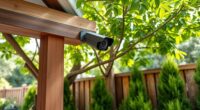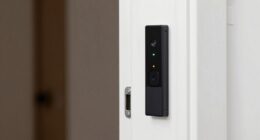When managing spare keys, only give copies to trusted people like family, roommates, or close neighbors. Avoid leaving keys in obvious outdoor spots and store spare keys securely in lockboxes or with trusted individuals. Regularly review who has access and revoke keys when someone no longer needs them. Consider advanced options like electronic locks for better control. If you want to learn how to balance convenience and security effectively, keep exploring these key management strategies.
Key Takeaways
- Limit the number of spare keys and only give copies to trusted individuals like family or roommates.
- Store spare keys securely in lockboxes or with trusted neighbors, avoiding obvious outdoor spots.
- Regularly review and update who holds spare keys, revoking access when necessary.
- Use reputable duplication services and consider electronic locks for better control and temporary access.
- Clearly communicate the purpose of each spare key and establish guidelines for their use.

Having spare keys can be a lifesaver in emergencies or everyday situations, but managing them properly is crucial to guarantee your security. When you think about key duplication, it’s tempting to make copies for everyone you trust. However, distributing too many spare keys can pose risks, so it’s essential to be strategic. You want to ensure that only trusted individuals hold duplicates, such as close family members, roommates, or a trusted neighbor. Keep in mind, each additional key increases the chance of it falling into the wrong hands, so limit the number of copies you make and store them securely.
Limit spare keys to trusted individuals and store them securely to protect your home and peace of mind.
Emergency access is a primary reason for having spare keys, but it also requires careful planning. You don’t want to leave your key in obvious spots outside your home, like under a doormat or flowerpot. Instead, consider a secure lockbox or a trusted neighbor who can access your property if needed. When giving someone a spare key, communicate clearly about its intended purpose. This not only prevents misuse but also helps maintain your peace of mind. Remember, in emergencies, quick access can make all the difference, whether it’s a medical issue, a lost key, or a lockout situation.
Managing spare keys also means keeping track of who has them. If you have multiple copies out there, it’s a good idea to periodically review and update who has access. If someone moves out or if you suspect a key has been compromised, take steps to change locks or re-duplicate keys to preserve your security. Using key duplication services can be convenient, but always opt for reputable providers to ensure the duplicates are accurate and reliable. This way, you’re not just granting access but also safeguarding your home against unauthorized entries.
Additionally, understanding security standards for key cuts and lock quality can help you choose more effective ways to protect your property. Using key control systems or electronic locks as alternatives to traditional spare keys can also enhance your security; these options allow you to grant temporary access or revoke permissions easily, reducing the risks associated with physical keys. But if you stick with physical keys, ensure you store extra copies in a safe location, ideally hidden from plain sight and known only to a few trusted people. Managing spare keys isn’t just about convenience; it’s about maintaining control over who can enter your property, especially when emergency access is needed. Taking these precautions helps you strike a balance between readiness and security, giving you peace of mind in everyday life and unforeseen situations.
Frequently Asked Questions
How Many Spare Keys Should I Keep for Each Property?
You should keep at least two spare keys per property, stored securely in key safes or lockbox options. Follow duplicate key policies to prevent unauthorized access, and consider integrating your spare keys with your security system for added control. Limit access to trusted individuals, and regularly review who has keys. This way, you balance convenience with security, ensuring you can always access your property when needed without risking unauthorized entry.
What Are the Best Locations to Hide Spare Keys Securely?
Imagine a garden gnome or a loose brick in your wall—these are perfect inconspicuous hiding spots. Use hidden key safes tucked behind flower pots, under doormats, or inside fake rocks near your entrance. These inconspicuous hiding spots make it difficult for intruders to find your spare keys. Keep your keys secure and accessible for trusted individuals, but avoid obvious places like under welcome mats or obvious hiding spots.
Should I Give Spare Keys to Neighbors or Friends?
You should consider giving spare keys to trustworthy neighbors or close friends you trust completely. They can quickly help you during emergencies or if you’re locked out. Make sure your emergency contacts are aware of this arrangement, so they know who has access. Avoid sharing spare keys with too many people to maintain security. Trustworthy neighbors or friends can be reliable, convenient options for handling unexpected situations efficiently.
How Often Should I Change or Update Spare Keys?
Think of your spare keys as trusted allies guarding your home’s secret door. You should update or change them every couple of years, especially if you’ve given duplicates to others or suspect a security breach. Regularly visiting locksmith services for key duplication guarantees your backups stay secure and functional. By keeping your backup keys fresh, you maintain control over who can access your sanctuary, just like a vigilant gatekeeper.
What Are the Legal Considerations for Granting Access to Others?
You should understand that legal obligations and access permissions govern who can access your property. Grant access only to trusted individuals and confirm you have written consent or agreements in place. Be aware of privacy laws and liability issues if someone gets injured or causes damage. Keep a record of authorized individuals, and always update permissions when someone’s status changes, to stay compliant and protect your rights.
Conclusion
Managing your spare keys effectively keeps your home secure and accessible. Remember, nearly 60% of break-ins happen through unlocked doors or windows, often because spare keys are misplaced or accessible. By controlling who has copies and storing them securely, you reduce these risks. Always review your key distribution regularly, and consider changing locks if you suspect keys are compromised. Staying vigilant with your spare keys can make a significant difference in protecting your home and peace of mind.









